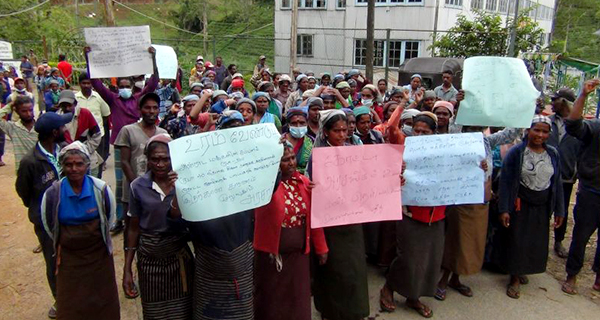Sri Lanka’s leading tea plantation workers have staged a protest against the fact that their wages are in no way sufficient to sustain their wages, despite the unbearable rise in the price of essential food items.
Hundreds of tea workers at the Torrington Estate in Agarapathana, part of the Lankem business group, staged a protest on Monday, November 29, at 12 noon as the union of public servants rallied at 12 noon to demand higher wages by 10,000 rupees. .
Lankem, which exported 8 million kilograms of tea last year, says it also owns 4% of the country’s rubber production. Lankem claims to have the largest tea production plant in the Uva Province with the Agarapathana Estate which harvests 1.5 million kilograms of black tea every year.
Workers have accused the company of failing to pay wages as Tomoya Obokota, the UN special envoy on contemporary slavery, is currently on an official visit to Sri Lanka to look into areas including the garment industry, plantations, tourism and domestic service.
The agitators pointed out that the plantation workers were consuming bread as a staple food and stressed that all plantation workers were facing a problem in getting their daily food supply due to the increase in the price of wheat flour.
Prima announced on Monday morning, November 29 that it had increased the price of wheat flour by Rs. 17.50 with effect from the 27th. Serendib has also confirmed that it has increased the price of a kilo of wheat flour by Rs. 17.50.
The protesting plantation workers further stressed that their economy had been hit hard by the plantation management’s urge to deduct their basic daily wage.
1000 per day
Although the basic wage of plantation workers has been fixed at Rs. 1,000 per day by the Wages Board and published in a gazette notification, they have emphasized that the plantation companies are taking steps to slash the basic wage by imposing various unfair conditions.
The plantation workers pointed out that in order to be paid a basic daily wage of 1,000 rupees, each worker had to pluck at least 20 kilos of tea leaves per day. According to provincial correspondents, if a worker is unable to pluck at least 20 kilos of tea leaves a day, the estate management will pay between forty and fifty rupees per kilo.
The protesting plantation workers further stated that one worker could not pluck 20 kilos of tea leaves per day due to the non-receipt of the required fertilizer for the tea plantation and the proper management of the plantation by its owners. During the protest, journalists were also made to see the weeds that had risen to subdue the tea plantations.
There are constant allegations from the plantation sector that plantation workers are slashing the daily wage of plantation workers, which has been increased to 1,000 rupees.
Lunch hour protests
Public servants in several parts of the country staged protests at lunchtime on Monday, November 29, demanding a 10,000-rupee pay rise, the removal of the 65-year retirement age limit and rising commodity prices.
The media has reported that similar protests have taken place in Colombo, Kandy, Beruwala, Galle and many other areas.
Development officials, Grama Niladharis, government officials from the management service and many other sectors have joined the protests with the support of more than 30 leading trade unions.
The demands of the protest include forcing public servants to withdraw the statement made by the Minister of Finance as a burden to the country and to repeal the circular restricting the right to freedom of expression.
Saman Ratnapriya, the co-convener of the Public Service Wage Trade Union Committee, who told the media that the struggle was the first trade union action that began today, has warned the government that if it does not pay attention, it will resort to continuous trade union action a week later.
The unions of the National Labor Advisory Council have demanded that the government provide a salary increase of Rs. 10,000 from this year’s budget to the private sector employees who are helping to strengthen the country’s economy.
